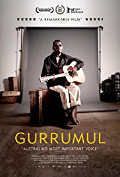
Directed by
Paul Damien Williams
96 minutes
Rated PG
Reviewed by
Bernard Hemingway

Gurrumul
Synopsis: A documentary about Geoffrey Gurrumul Yunupingu, Australia's first internationally acclaimed solo Indigenous singer who died in July 2017.
At its best writer-director Paul Damien Williams’ film is a potent illustration of the gulf between whitefella and blackfella worlds, at its worst it is a promotionally reverential flattering of its reluctant star.
Its compromised status is evident right from the film’s opening titles which tells us that Gurrumul approved the film three days before he died and that his family has lifted the usual prohibition in Yolgnu culture on the use of the name and image of someone who has died. Given that Gurrumul was blind and near death that “approval” seems more than a tad questionable and, one asks oneself, what value is an interdiction that is waived so conveniently for the whitefella. By the film’s end both reservations have been proved well-founded.
For those, like me, who know nothing of Gurrumul beyond his name the film gives us at least the bare bones of a biography. He was born blind on Elcho Island in East Arnhem Land, a member of the Yolgnu people (who, for those interested were featured in Stephen Johnson’s commendable year 2000 film Yolgnu Boy). Surprisingly there is some video footage of Gurrumul as a toddler and young child in which, much as he does as an adult, he seems understandably, lost. We briefly meet his parents and some relatives who recall him as child. We find out that he was a member of Yothu Yindi and the Saltwater Band in the 1980s and then move to his career as a solo artist, to which the bulk of the film is given over.
From this point the film assumes a conventional behind-the-scenes music documentary format, interspersing dressing room and between-gig material with brief snatches of Gurrumul in performance, even managing to insert an encounter with Sting who with white-boy rock-star glibness refers to Gurrumul as “my brother” and makes a crack about the irony of the refrain “I’ll be watching you” in their duet rendition of ‘Every Step You Take’. This segment is symptomatic of the film’s seemingly unintentional Anglocentric bias.
As we see in an amusing opening interview in which a callow ABC reporter tries to wheedle a reply to her vacuous questions and is met with complete silence, Gurrumul would not have been an easy subject. Even so there doesn’t appear to have been any attempt made to engage with Gurrumul although frequently the camera closes in on his sightless eyes as if in search of some understanding. Instead we get the largely unspeaking singer as mediated by Michael Hohnen, a double bass player who became Gurrumul's minder and close musical collaborator. How this relationship worked materially, financially and creatively, however, we are never told. This omission is but one of the many instances in which the film skates across the surface of things: Gurrumul’s somehow getting up to live performance speed in an hour on Sting’s song; his disappearance on the eve of a big American tour; and most obviously his death from renal failure after walking out of a Darwin hospital, something which is not so much as mentioned. Of course, budgetary issues may have been at play in its final form but ultimately Williams’ needed to probe deeper so that his film did not appear to be an assemblage of whatever material he happened to have to hand.
If Gurrumul's speaking voice is barely heard Perhaps most disappointingly there is very little of his singing voice. There is one song, about his descent from the Rainbow which comes close to being the film’s theme song but for the most part we get a snatch of a song here, a snatch of another there. What pleased the ecstatic (white) audiences so much we can only guess at. When it comes to Gurrumul’s final stage appearance at the Sydney Opera House with a “classical” score by composer Errki Veltheim, the latter probably gets more screen time than the singer.
Ultimately, as the many shots of the singer being shepherded around by Hohnen suggest, one gets the feeling that in reality “Gurrumul” is a whitefella construct and that this film is purpose-designed to enshrine it in whitefella culture.

Want more about this film?


Want something different?




